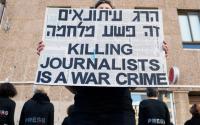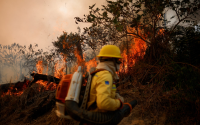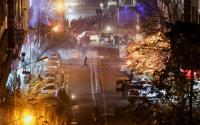16 August 2004Tom EngelhardtZnet
What's wrong with this picture? The United States invaded Iraq to "liberate," above all others, that country's oppressed Shiites, so many of whose rebellious relatives were buried in those "killing fields" Saddam Hussein created while crushing their 1991 uprising; killing fields that were an obligatory stopover for Paul Wolfowitz and his ilk on their brief passages through Iraq. ("We thank all of the citizens of Iraq who welcomed our troops and joined in the liberation of their own country," said George Bush on the USS Abraham Lincoln in his "mission accomplished" speech, as on countless other occasions.) So who are we killing now -- and whose dead bodies are we counting up with a certain pride? Iraqi Shiites. ("Captain Carrie Batson, a marine spokeswoman, said: 'We estimate we've killed 300 anti-Iraqi forces in the past two days of fighting.'") We also invaded Iraq to "liberate" suffering Shiite cities, including the Shiite slums of Baghdad, which had been given the short end of the electricity, food, and jobs stick by Saddam. Now, in those cities, still lacking regular electricity or clean water, short on food, and short on jobs, what are we doing? We're strafing, rocketing, and bombing parts of them. Both Najaf and Sadr City, the vast Shiite slum in Baghdad, experienced this yesterday.
Or what's wrong with this picture? We invaded Iraq, as our President has stated so many times, to offer the Iraqis "democracy." ("In Iraq," he typically said, addressing Americans four months after Baghdad fell, "we are helping the long suffering people of that country to build a decent and democratic society at the center of the Middle East.") Now, our version of Iraq is led by an unelected Prime Minister, Iyad Allawi, the ex-Baathist head of an exile organization, the Iraqi National Accord, made up largely of ex-Baathist military officers, backed by the CIA and Britain's M16, known for planting car bombs in downtown Baghdad in the 1990s. His first democratic impulse on learning that he would be the new Prime Minister was to suggest that perhaps the country's January elections should be postponed. (He backed down. It wasn't a good line for the home front -- in the U.S.) He just banned a major Arab television network, al-Jazeera, instituted a curfew in Sadr City (presently being ignored) which he doesn't control, possibly murdered six insurgent suspects in cold blood in a Baghdad police station (a story that disappeared beneath the waves), and reinstituted the death penalty for more or less all acts of insurgency or rebellion; while a judge connected to his regime has issued warrants against former Pentagon darling Ahmed Chalabi (counterfeiting) and his nephew Salem (murder). The State Department and the CIA, now firmly ensconced in the largest "embassy" in the world in Baghdad's Green Zone, have in the meantime just finished instituting their own American-style "regime change." They (and Allawi, their man in Baghdad) have taken down the Pentagon neocons (and their man Chalabi, at present in Iran).
So fighting and in-fighting are everywhere; planes are bombing and helicopters strafing parts of the capital, while insurgent mortar shells land nightly near or on government buildings. (Three hit the Oil Ministry Monday, according to an NPR reporter). Amid the mayhem, Allawi has officially sent "his" troops and ours south to crush another of his opponents -- the young radical cleric Muqtada al-Sadr -- and "re-liberate" the resistant Shiite south through brutal combat on the streets of Najaf and elsewhere.
Allawi's administration, now the "face" of Iraq -- American officials had long talked about putting an "Iraqi face" on things -- would in another age have been called a puppet regime. (Keep in mind, however, that puppets can have their own strong ideas about policy and can make their masters heed their desires in all sorts of complex ways.) Of course, in our press such things cannot be said directly, so you get strange, coded passages that cry out for interpretation like, for instance, this one in an article by Edmund Sanders and Henry Chu in the Los Angeles Times (Most of Najaf in U.S. Control, 8/10/04): "In an effort to improve coordination, U.S. troops took 'operational control' of Iraqi police and national guard units in Najaf, an American military spokesman said." Operational control indeed.
What you can follow, now that Iraq has returned to the front pages of our papers, is the fighting in places like Najaf; what you can't learn is much of anything about the decision to fight and what to make of that decision. If the foot soldiers are largely in sight; what's missing is the brain; or put another way, the main character MIA in the present Iraqi drama, the ghost in our media machine reporting from Iraq, is that over-stuffed "embassy" in Baghdad's Green Zone.
Remember when -- it seems eons ago -- the Coalition Provincial Authority was running things in Baghdad, and our man there was the desert-booted L. Paul Bremer? Either he or military spokesman Brig. Gen Mark Kimmett was in front of the cameras hourly, it seemed, making announcements about Iraq's fate. From Donald Rumsfeld and Paul Wolfowitz on down, in fact, the Pentagon hardliners and neocons, whose emissaries arrived in Baghdad ready to rule (and without any Iraqis except Ahmed Chalabi in tow), seemed to love nothing more than face-time in the media.
What the "turning over of sovereignty" at the end of June signaled was the arrival in Baghdad of a new regime from the State Department and the CIA. With new regimes, of course, come new styles and the new style of this desert-bootless one is no-face-time at all. Soft-spoken Ambassador John Negroponte, a man with much brutal counterinsurgency experience in his background, has simply faded into the woodwork, as has his huge staff, while they've put Iraqis forward to do all the talking. Try to remember the last piece you've seen about them or our military high command in Iraq. Try to remember the last piece you've seen in our media even speculating on their strategies, on what they intend in Iraq. It's a simple case of out of sight, out of media mind.
But as Michael Schwartz has noted, they have quietly made a momentous decision. They've decided to roll the dice, go all the way in Najaf. It's a massive gamble and its brutal results are already before us.
We're now in the seventh day of bloody combat, involving tank, helicopter, Predator drone, and jet assaults on the downtown area of one of Iraq's holiest cities, which is -- or at least should be -- shocking. Where is that liberation now? But it would be -- or should be -- a shocking decision in relation to any densely populated city, holy or otherwise. And yet where are the anguished or angry editorials in American newspapers? Is this really the "course" we want to stay on? Is this what we're really intent on not "cutting and running" from? If so, just remind me: Who exactly gave us the right to bombard heavily populated urban areas or let Predator drones armed with Hellfire missiles fire into them? What exactly does this have to do with liberating anyone? Is it really enough that we call the radical Shiite militias -- largely made up of unemployed young men we didn't bother to "reconstruct" (and al-Sadr did) in our many months as the official occupying power in the country -- "anti-Iraqi forces," or "terrorists," or "criminals," or "thugs"?
I don't, of course, want any of this to impugn our generosity, or Allawi's. We may be destroying downtown Najaf, but our Iraqi prime minister has sworn that we'll be generous indeed in offering reconstruction funds to rebuild the city afterwards. ("Allawi promised that an end to the militiamen's occupation of An-Najaf's old city and its golden mosque, one of Shiite Islam's most sacred shrines, would be followed by generous government funding for the city's reconstruction.") Now that we've been rocketing the city and putting tanks in its sprawling holy cemetery where the fighters of Moqtada al-Sadr have been holed up -- "U.S. and Iraqi forces 'will not allow them to seek sanctuary and hijack this holy cemetery from the people of Iraq,' Col. Anthony M. Haslam, commanding officer of the Marines in Najaf, said in a statement. 'We will not allow them to continue to desecrate this sacred site, using it as an insurgent base of operations. There will be no sanctuary for thugs and criminals in Najaf.'" -- now that we're destroying Najaf to save it, I just want to know: How exactly do you rebuild an ancient cemetery after you've blown parts of it to bits? How do you reconstruct the dead? I'm sure there's a way.
And more of the same may lie ahead. We know, for instance, that Prime Minister Allawi has already given the Americans a green light to push their combat operations into the previously off-limits area around and including the city's sacred Imam Ali Shrine. "'We fully understand the implications,' the U.S. official said, speaking on condition of anonymity. But by launching sorties from inside the mosque and nearby buildings, Sadr's fighters had turned the shrine into 'a legitimate target of attack,' the official said. He added that any move against the mosque would almost certainly be worked out in advance with Najaf officials."
Don't worry, though, whatever we knock down, we can just rebuild. (Of course, just replace Najaf's holy cemetery or the Imam Ali Shrine with some more familiar revered site, say, the Vatican, or the Wailing Wall, or in an American context, the White House and see how comfortable all this really feels.) Looked at in any light but ours, air attacks on heavily populated civilian areas in Najaf or elsewhere are really criminal acts (no matter the nature of the fighters on the other side); but forget morality, since it's really not much of an issue in this country, certainly not for the most "moral" administration we've ever elected or the media that covers them.
But didn't any of these people ever pick up a copy of How to Win Friends and Influence People? Don't they know that all those Iraqis we've killed have families and friends, as do the buried dead we're saving from desecration by blowing them to kingdom come? ("Soldiers involved in the fighting described how many of the most recent graves are marked by photos, which crumble when U.S. forces shell the cemetery walls to reach the militiamen hiding within. 'Wives, daughters, husbands,' said Sgt. Hector Guzman, 28, of the 1st Cavalry Division's 5th Regiment. 'You just know you're destroying that tomb.' The Houston native shook his head. 'It doesn't feel right sometimes.'") Don't they know that military "victories" in wars like this are almost invariably Pyrrhic in nature?
Every one of our top officials in Baghdad is a veteran of the Vietnam experience, but none of them seems, on the evidence of recent developments, to have learned a thing from it. Yes, you can hem an overmatched enemy army into a city and defeat it, even crush it (whatever the toll on the city itself). But no matter how many people you kill, it's far harder to do that with a movement. Already unintended consequences of our assault on Najaf are spreading. On Monday, 8/9/04, after serious threats from al-Sadr militants, the southern oil fields around Basra were even briefly shut down -- and global oil prices spiked yet again.
What our officials in Baghdad have done over the last year and a quarter is take a junior cleric, an extreme but relatively minor figure on the Iraqi religious and political scene, although also a man with growing numbers of young, poor followers, and make him into a figure to be reckoned with. Now, in a land with a powerful tradition of martyrdom (not exactly an unknown term, let's remember, inside Christendom), they threaten to create a martyr, and if they do, they will certainly live to regret it, as they would live to regret damage done to the Imam Ali Shrine, even if al-Sadr was hiding an army inside.
And remember, al-Sadr's is still a minority movement. The Americans have yet to experience what Iraq would be like if the Shiite majority turned actively against them and took to the streets. In the meantime, we've shown Iraqi Shiites what American-style liberation means. We've just ordered all civilians out of downtown Najaf for their own good. Free-fire zones anyone?
[This article first appeared on Tomdispatch.com, a weblog of the Nation Institute, which offers a steady flow of alternate sources, news, and opinion from Tom Engelhardt, long time editor in publishing and author of The End of Victory Culture and The Last Days of Publishing.]






